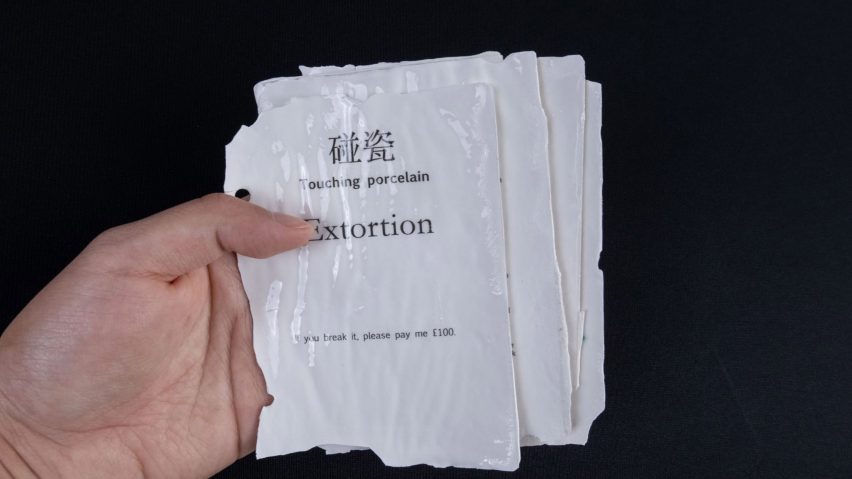In the wake of the 2022/2023 academic year, we spotlight some of the most pioneering student design projects recently pinned on Dezeen's dedicated School Shows Pinterest board.
In this roundup, we take the summer break as an opportunity to distil our run of 2023 summer shows down into 10 intriguing design projects from our School Show Pinterest board.
The selected works explore both proposed real world sustainable design solutions to combat environmental damage, as well as expressing students' personal identities and lived experiences.
Projects that have been selected include unconventional jewellery that have no three-dimensional components, a bench made from timber that combats loneliness, and a graphic design project that uses ceramic shards in place of normal paper.
This roundup includes international universities such as Lucerne School of Art and Design, Parsons School of Design, University of East London, Savannah College of Art and Design (SCAD) and University of the Arts London.
Scroll down to see ten projects from industrial, interior, product, furniture and graphic design courses and browse our School Shows board to see more.
Nautilus by Léon Bolz, Bachelor Object Design student at Lucerne School of Art and Design
Léon Bolz's project called Nautilus is a hybrid between a net and a spade that aims to eradicate the damage to ecosystems by invasive species.
The product harvests harmful non-native creatures allowing them to be processed for consumption as food.
Sead by Mara Zimmerman, MFA Industrial Design student at Parsons School of Design
Securing and nurturing seeds during their growth was the primary reason that student Mara Zimmerman developed Sead.
The product takes the form of a tray made from waste generated during seafood processing, which is rich in nutrients for growing plants. It is designed for use at home and in urban gardens rather than at a commercial scale.
A Cacophony of Creases by Isobel White, BA Interior Design students at University of East London
Isobel White's lighting design project A Cacophony of Creases comprises a light nestled in folds of leather.
The fawn-coloured material comes from the high-end sports car industry, the offcuts of which White hopes will lend similar luxuriousness to the light.
25-degree by Harvey Mckellar, BA (Hons) Product Design student at Sheffield Hallam University
Harvey Mckellar designed a wooden bench that aims to tackle loneliness by encourages interaction between sitters through its angular design.
The 25-degree bench is designed so that the further away users sit, the more they face each other.
Living Traces: Pigments on the Skin is the result of student Lea Tschanz daubing the human body with pigment in place of physical jewellery.
She uses tools, utensils and other small objects to mark the skin in reference to the "completely archaic, completely primal" art of body painting.
Alistair Badger's project Moulding The Past proposed a renovation of a hangar at the De Havilland Aircraft Heritage Museum.
The structure references the design of the De Havilland Mosquito – a plane designed in the 1940s for use in world war two.
Bending laminated wood was the main technique that student Milan Bhullar used when working on the Hooked Table.
Bhullar uses her work as a method of healing and contemplation, manifested in a table with a small circular seat and undulating ribbon-like legs.
Urbento by Yas Kinsey, BA (Hons) Graphic Design student at Nottingham Trent University
Yas Kinsey designed the concept and branding for a selection of ready meals based on traditional Japanese bento lunch boxes.
Urbento intends to help people with busy nine to five lifestyles to get healthy, nutritious meals that fit into their schedules.
Dirty Business by Clara Batista, Bachelor in Design student at IE School of Architecture and Design
Dirty Business – Clara Batista's thesis – explores the role of disgust and dirtiness in contemporary society as well as the hidden practices present in the textile industries.
These ideas are demonstrated through two provocative materials: human hair and mycelium fungi.
Pengci (Extortion) by Naiwen Zhang, BA Graphic Design student at University of the Arts London
Acknowledging the disconnection between modern day graphic design and conventional craft techniques, Naiwen Zhan chose to print their work on slices of porcelain made to be as thin as paper.
Pengci (Extortion) encourages people to handle and touch the work while being conscious of its fragility.
Follow Dezeen on Pinterest
Pinterest is one of Dezeen's fastest-growing social media networks with over 1.4 million followers and more than ten million monthly views. Follow our Pinterest to see the latest architecture, interiors and design projects – there are more than four hundred boards to browser and pin from.
Currently, our most popular boards are installations and houses.

